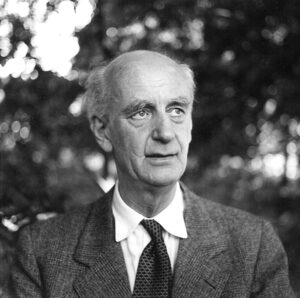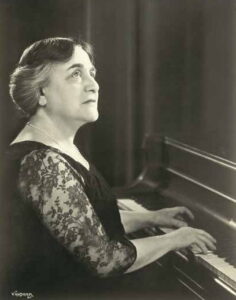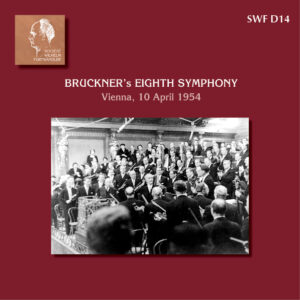Category: Actualité
News
For the SWF Board, the summer will be a productive one. Let’s take a look at our holiday homework:
– Preparations for the Annual General Meeting in November ;
– Upcoming digital product releases for September, November and December, featuring Schumann, Wagner, Haydn, Sibelius, Strauss… In particular, the product to be released on 20 September will be a real event. We’ll tell you more at the end of August…
– The publication of some fifteen Furtwängler concert programmes, which have just been acquired by the SWF and which will gradually be added to the “Get the programme” page;
– Preparation of our future audiovisual podcasts;
– An update of our streaming platform.
In any case, there’s one less thing to worry about: storing our old physical products. As we’ve already mentioned, this belongs to the past, as our box is now empty and closed…

As you may have noticed, the SWF hasn’t hosted a lecture in a long time, and the few that were scheduled over a year ago had to be cancelled.
There are several reasons for this. First and foremost, the death of Sami Habra, our keynote speaker for almost fifty years, has deprived us of an exceptional speaker and a number of lecture topics. The COVID has also come and gone, and the problem of finding a venue in the Paris region at an affordable price is another reason. But the main reason is undoubtedly the present time. Fewer and fewer members were coming to these meetings, and the reproach of “Parisianism” was recurrent.
The transition to digital technology, which began 7 years ago, is a wonderful opportunity to provide lectures for as many people as possible. We recently presented a video on Bruckner’s 8th Symphony. We will be renewing and developing this approach, whether by interviewing a well-known figure or organising a round-table discussion.
The end of face-to-face lectures? Not necessarily, if the right opportunity comes along.
In any case, it marks the end of a systematism, and the birth of a new sharing tool.
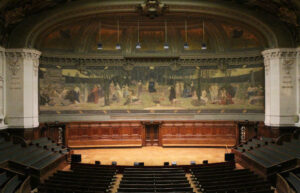
The main amphiteatre of the Sorbonne
We regularly publish facsimiles of programmes of concerts given by Furtwängler as conductor of London’s Philharmonia Orchestra.
Here is the programme for 25 October 1951 at the Albert Hall, with Dame Myra Hess, an English pianist. Although in France, for example, her name is less familiar than many of her contemporaries, her memory is still very much alive in the hearts of English music lovers.
Roger Smithson provides us with some details.
While vintage newspapers have brought to light concerts that had escaped the census, one must remain cautious and cross-reference such discoveries with other sources.
For example, the Frauenfreude-Mädchenglück, a Czech German-language periodical, in its January 23, 1929 issue, announced a concert by the Vienna Philharmonic at Prague’s Lucerna Hall on Monday February 18, with Furtwängler conducting. This visit would have followed the series of fifth subscription concerts at the Musikverein, on the 16th and 17th. It would have included the second half of the program — Mahler’s First Symphony — while the first half would have featured Beethoven’s Symphony No. 1 and Strauss’s Death and Transfiguration. How can you possibly believe that this concert is not actually taking place when you read the last sentence of the concert announcement: tickets are now on sale!
As this Prague escapade is missing from the list of concerts that can be consulted on the Wiener Philharmoniker website, we contacted the Wiener Philharmoniker Archives, and the answer came quickly: although Furtwängler mentions this series of concerts and the Prague concert in a letter dated January 8, this concert does not appear on any of their lists, nor in the printed programs.
The concert was therefore cancelled, but the reason for this remains unknown.
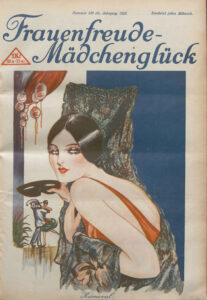
This photo appears on our site, and it seems to tell a story: the meeting of two giants.
The episode takes place during the Berliner’s January/February 1932 European tour with Furtwängler, whom photographer Erich Salomon — mentioned earlier in our pages — accompanied. On the ferry that carried them overnight (February 8-9) from Harwich (east coast of England) to Hoek van Holland, was another celebrity, Charlie Chaplin.
Erich Salomon was determined to bring them together in front of his lens. When he approached Chaplin, asking his assistant for help, he was told that “The Tramp” didn’t even know Furtwängler’s name, and that he was already in bed. Finally, at 6:30 a.m. the next day, they met again as the boat was about to dock. The two protagonists silently shook hands, smiled at the camera, and parted without a word…
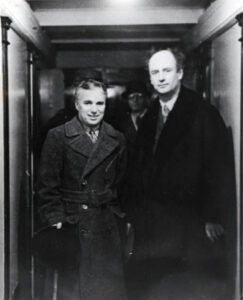
We didn’t know that. Furtwängler conducted Tristan und Isolde at the Frankfurt Opera, as guest conductor. This was in June 1921 — when exactly? — before the 28th. The only evidence of this, at least for the moment, is an insert in the evening edition of the Hamburger Fremdenblatt, dated Tuesday, June 28. Recall that Furtwängler had been the leader of Frankfurt’s Museumkonzerte since 1920.
Apparently it was a success, also because of the presence, in the role of Isolde, of Béatrice Lauer-Kottlar (1883-1935), who later became better known as Sutter-Kottlar after her marriage to Otto Sutter, a pressman. After Strasbourg ( did she meet the young Furtwängler there?) and Karlsruhe, she had been based at the Frankfurt Opera since 1917, where she performed major dramatic roles: Donna Anna, Leonore, Brünnhilde, The Marschallin…
Does anyone know more about it?
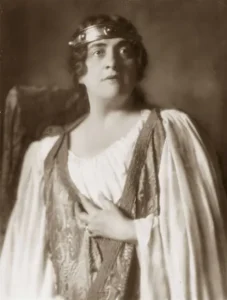
We recently published Furtwängler’s recording of Bruckner’s last Eighth, from Vienna 1954, with a facsimile of the accompanying program.
Here is the facsimile of the program of another Eighth, performed by the Berlin Philharmonic in Hamburg’s Conventgarten on January 7, 1938. The Orchestra’s season was held there, and the concert often preceded the one in Berlin, thus serving as a kind of practice run.

The Conventgarten building, Hamburg
The clearance sale, which started on March 1 and ended on March 22, was a huge success in France and even more so abroad.
Many products are no longer in stock, which was our primary objective. What’s left is still available by the unit, but — as we have to empty the entire box by the end of June — it will soon no longer be possible to fulfill orders.
As a result, we have set June 2 as the deadline for ordering CDs and books. From that date, only digital products (SWF D01 to SWF D14) and streaming will be available on this site. Discs from the German Society will nevertheless be presented, but should be ordered from them.
This is a new chapter. It’s also the clearest sign of the digital age. There’s no need to regret it: despite what some people may think and say, digital technologies provide far more opportunities for exchanges (studies, streaming, podcasts…).
Of course, Furtwängler did not inspire as many books as Napoleon or Wagner. But still…
Besides his own writings, notably Ton und wort and Gespräche über Musik, which have been translated into several languages, there are a number of books by German, French, American, English and Japanese writers, focusing on various aspects of his personality.
His life, career, technique and conducting style have been the subject of numerous well-documented and pertinent studies.
This bibliography is once again updated.

This is one of those facsimiles of programs we have been waiting for, as the concert is so emblematic of Furtwängler: his orchestra, in his concert hall, performing his repertoire, at the pinnacle of his career. It was the end of June 1943, and thanks to the recording, the event will live on forever.
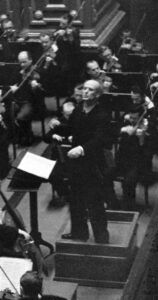
The Wilhelm Furtwängler Centre of Japan (http://furt-centre.com/english/eindex.htm)
The cover, reproduced below, clearly identifies the content. No further comment, except to point out that the 1943 Stockholm Schubert concert was the subject of a product from our association (SWF D06), available as a high-definition download (€9).
The Japanese product is available at a price of 6,500 yen (around €40 or US$43), in addition, of course, to the membership fee.
One point is worth emphasizing: the mastering was carried out with both orchestras (Berlin and Vienna) on the same pitch, A = 443. We’ll come back to this point shortly, as it is the subject of much debate.

You may find our new product in the shop, and available for streaming:
SWF D14
As already mentioned in the last two news items (22 March and 29 March), this is the recording of Bruckner’s 8th Symphony on 10 April 1954, in Vienna. 70 years ago…
You will appreciate the outstanding sound we have been able to obtain from the tape, and by the work of Christophe Hénault, who has managed to erase many of the ‘scoriae’ that tainted the music.
On the home page, you’ll find a link to a podcast produced by Guilhem Chameyrat, in which our President, Félix Matus-Echaiz, speaks with Jean-Claude Hulot, music journalist and Bruckner specialist. This podcast is also available to download in the digital pack (and: https://youtu.be/a1KU47jbpiY?si=plGjCra_-vwEETQn), along with:
– audio files (HD and CD quality),
– a digital booklet (in French and English), with a text by Mark Kluge, and many photos,
– an article about technical aspects, A tribute to the C12, pdf format,
– pdfs of the cover and inlay card, for those wishing to burn a CD (attention: over 80′ of music),
– a facsimile of the concert programme.
Lastly, a wish. We have been releasing albums (the recent ‘Lucerne’, the ‘Stockholm Ninth’ etc.), but we haven’t had any feedback… You are welcome to write a comment to this article. Feel free to do so!
